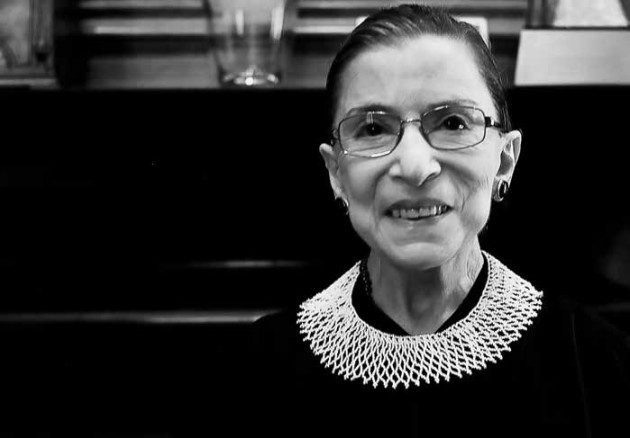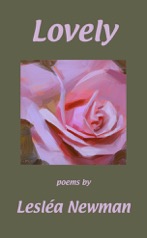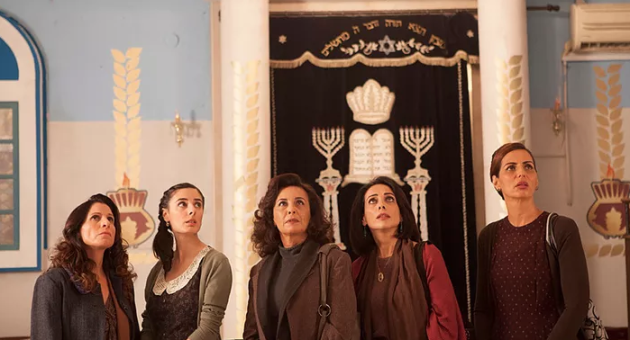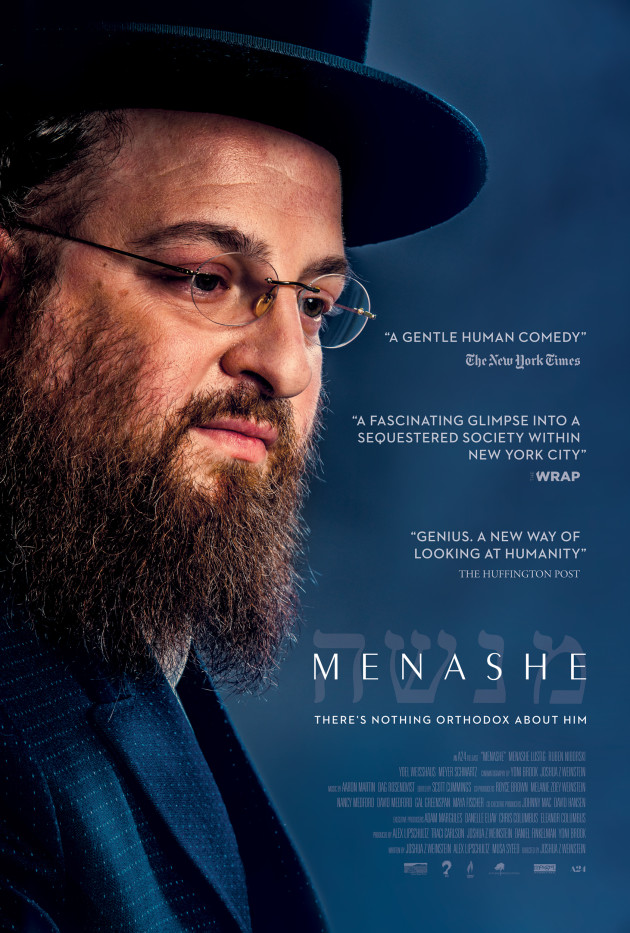Author Archives: Helene Meyers
December 21, 2020 by Helene Meyers
7 Jewish Feminist Highlights of 2020
Let’s face it—2020 has been a clusterf**k of a year, and I can’t wait to see it recede in the distance of my rearview mirror. While most Jews have observed Passover, the High Holidays, and Chanukah virtually, the national COVID fallout from Thanksgiving, Christmas, and New Year’s is likely to be heartbreaking, even more so given that a vaccine for most of us is just months away. The murders of George Floyd and Breonna Taylor tragically reminded us that we must continue to fight to make the truth that Black Lives Matter self-evident. And among the many, many hits that democracy took this year was the ramrodding of Amy Coney Barrett into the Supreme Court seat that Ruth Bader Ginsburg honorably and notoriously held from 1993 until her death on erev Rosh Hashanah.
- No Comments
December 18, 2019 by Helene Meyers
7 Jewish Feminist Highlights of 2019

(Photo by Joan Roth) Ruth Bader Ginsburg
Between impeachment hearings, an overstocked Democratic presidential field, intensifying attacks on abortion rights, continued governmental atrocities against immigrants, and hate crimes against Jews and Jewish institutions, 2019 has been quite the year (and that’s understatement!). But as Deborah Lipstadt wisely counsels in her book Antisemitism: Here and Now, we need “to balance the ‘oy’ with the ‘joy.’” In that spirit, I offer my annual seven Jewish Feminist Highlights (seven being the number associated with creation and blessing in the Jewish tradition).
- No Comments
December 13, 2018 by Helene Meyers
7 Jewish Feminist Highlights of 2018
I don’t need to tell readers of Lilith that parts of this year have been soul-crushing for Jewish feminists. In 2018 we mourned those massacred at the Tree of Life synagogue in Pittsburgh, and many of us gnashed our teeth about antisemitism in our own feminist movements.
But Jewish feminist hope, grit, and creative resistance were also part of 2018. As the secular year winds down, let’s remember and celebrate all that has healed and nourished our souls. Here’s my annual list of 7 Jewish feminist highlights (7 being the number associated with creation and blessing in Jewish tradition):
- No Comments
August 7, 2018 by Helene Meyers
When an Accused Sexual Harasser is an Academic Superstar
The news report that Steven M. Cohen, a luminary in Jewish sociology, is an alleged serial sexual harasser sickened me. New York Jewish Week broke this story that brought the #metoo movement to the heart of Jewish Studies. Cohen is currently a professor at Hebrew Union College, Jewish Institute of Religion in New York and has just voluntarily resigned his position as the director of the Berman Jewish Policy Archive at Stanford University; his work on contemporary Jews is widely known and supported not only by prestigious academic institutions but also by well-regarded Jewish communal networks.
Cohen’s sexual misconduct has apparently been part of his professional modus operandi for decades. He has not denied the multiple charges against him, which include touching women’s breasts in public, propositioning mentees for sex, and using sociological research as a screen for homophobic conduct.
- 1 Comment
May 24, 2018 by Helene Meyers
Why Did I Cry for Philip Roth?
Unbidden, copious tears were my initial response to the news of Philip Roth’s death. That visceral response of grief surprised me. Of course, as a professor of Jewish literature, I have written about and taught some of his books during the course of my career, most notably, The Human Stain, The Plot Against America, and, to a mostly female group of adult learners, Portnoy’s Complaint (I freely admit that I am much too prudish to teach the last to a group of traditionally-aged undergraduates).
But much as I admire Roth’s literary chops and chutzpah, he was never the center of my Jewish American literary universe. My critical kvelling tends toward such heavy hitters as Michael Chabon, Rebecca Goldstein, and Tony Kushner as well as such lesser known figures as Tova Mirvis, Judith Katz, and Michael Lowenthal. As a Jewish feminist, I found Roth’s literary performances of bad-boy masculinity more than a bit trying (I’m attempting understatement here). And his larger-than-life reputation (much of it earned, some of it the result of a critical boys’ club) tended to suck the air out of the room for other Jewish writers.
The contemporary Jewish American literary renaissance is broad and deep; Roth-mania inside and outside the academy had the potential to lionize the one at the expense of the many, especially women and queer writers of all genders. My personal critical practice has been to give him his due but to avoid idol worship. I wouldn’t, couldn’t put him on a patriarchal pedestal, but neither would I leave him behind in the misogynist mud.
- 1 Comment
February 5, 2018 by Helene Meyers
Academic Grief: A Satire
A recent memo about changes in departmental budget protocols at my university included the following:
“Items not allowed under department and program budgets: Given the tightness of budgets across campus, department and program funds should only be used for expenses related to the professional work of the department. Faculty are asked to avoid expenses that are not directly related to the mission of the department or program. A few exceptions to this rule may be allowed. For example, sending flowers to the funeral of a department member or emeritus faculty is an allowable expense. When in doubt over the nature of the expense, please consult the Dean of the Faculty for approval prior to committing funds.”
While the above is real, a faux memo follows that might provide guidelines for those funeral flowers. Even the irreligious among us should pray that cost-conscious administrators do not adopt these guidelines.
- No Comments
January 11, 2018 by Helene Meyers
Our Bodies, Our Memories, Our Poetry: A Review of Lesléa Newman’s “Lovely”
 Lesléa Newman is a woman of a certain age, and Lovely, her new volume of poetry (Headmistress Press, $15), revels in that fact. In this collection, Newman’s birth family shares these pages with her beloved. She chronicles her shifting relationship with her own body as she memorializes those who were often violently forced to leave theirs behind. While many of these poems celebrate the sensual pleasures of the past and present, Newman also fleetingly envisions a world to come.
Lesléa Newman is a woman of a certain age, and Lovely, her new volume of poetry (Headmistress Press, $15), revels in that fact. In this collection, Newman’s birth family shares these pages with her beloved. She chronicles her shifting relationship with her own body as she memorializes those who were often violently forced to leave theirs behind. While many of these poems celebrate the sensual pleasures of the past and present, Newman also fleetingly envisions a world to come.
Newman’s trademark compassion is on full display in “Home Safe.” Here the language of nursery rhymes frames the trauma of childhood sexual exploration and abuse: “Little Girl Blue/What happened to you?/Who was it? Who?/And what did he do?” Yet even as the speaker gives full voice to a little girl’s confusion and pain, she also belatedly recognizes that the boy child who overpowered her must himself also have been a victim: “Little Boy Blue,/What happened to you?/Who was it? Who?/And what did they do?”
Several poems are devoted to the life and death of Newman’s mother, the subject of a previous volume of poetry, I Carry My Mother (2015). In the prose poem “Maidel,” the foibles and wisdom of a loving Jewish mother are wittily conveyed, while the somber “My Mother Cups Her Hand” reflects the words not spoken as death becomes imminent.
In “1955-2001: A Hair Odyssey,” Newman’s “frizz bomb/kinky head/Jew fro/ the human barometer” charts her aging process and a path to self-acceptance. The gorgeous “Blessed are the Weeds” metaphorically tells a similar story as “they are not afraid to take up space” and “they respect their roots.” More whimsical is “Your Loss: To The Lovely Butch In Front Of Me At The A&P,” which presents a femme consumer of Hungry Man Dinners as fully able to appreciate “the gluten-free, sugar-free, dairy-free yet delicious-looking pair of sticky buns” in said butch’s basket. And while very few poets could pull off turning a kasha knish into a suitable subject for poetry, Newman manages it in “Ode to a Knish Shop.”
Reminiscent of Newman’s dazzling 2012 October Mourning: A Song for Matthew Shepard, “That Night” is the litany of those who were murdered at Pulse, a gay nightclub in Orlando, on June 12, 2016. In this moving poem that also does the work of queer history, the bar scene is juxtaposed with the horrific death scene that unfolded: “That night the music pulsed through our veins/That night the bullets tore through our veins.” Such historical horrors give rise to “A Farewell to Arms,” a Newmanesque version of John Lennon’s “Imagine” in which bullets, pistols, missiles, stoning, torture, and snipers are no more. In this world to come, there will be “No more hatred, no more blame/No more killing in God’s name.”
The final section of the volume, titled “Nasty Women,” is an intensely personal paean to queer love. The historical “To Have and To Hold” commemorates May 17, 2004, when Massachusetts issued the first marriage certificates to queer couples “bursting with pride.” “The Coming Storm” cunningly counterpoints a meteorological disturbance with orgasmic love and passion: “Outside nasty weather/Inside nasty women.”
Lovely truly is a lovely read and a reminder that the most personal poetry can simultaneously speak to our collective lives, bodies, and histories.
Helene Meyers is Professor of English and McManis University Chair at Southwestern University in Texas. The author of three books, most recently Identity Papers: Contemporary Narratives of American Jewishness, she is currently at work on a project about Jewish American movies. Her more journalistic work has appeared in Lilith, Tablet, Forward, Ms. Magazine Blog, the Washington Independent Review of Books, the Chronicle of Higher Education, and Inside Higher Education. Find her on Twitter: @helene_meyers
The views and opinions expressed in this article are the author’s own and do not necessarily reflect those of Lilith Magazine.
- No Comments
December 21, 2017 by Helene Meyers
7 Jewish Feminist Highlights of 2017
2017 has been a doozy of a year. It’s tempting to fall into despair or to become inured to news that goes from bad to worse. But we need to resist and to persist—and to do that, we need sustenance. The following have functioned as Jewish feminist manna for me this year, and I hope that Lilith readers find these 7 highlights of 2017 nourishing as well. (For those curious, 7 is the number associated with creation and blessing in Jewish tradition!)
1) Thanks to a lawsuit brought by Renee Rabinowitz, a retired lawyer and Holocaust survivor in her 80s, El Al airlines will no longer be able to ask women to change their seats to accommodate ultra-Orthodox men. As someone who wrestled with such a request on my first trip to Israel, I am inspired by Rabinowitz’s pursuit of justice and gender equality.
2) Jewish feminists had a banner year at the movies, with Gal Gadot playing Wonder Woman and Orthodox director Rama Burshtein showing her range with The Wedding Plan, whose comic pathos sharply contrasts with the intensity of her 2012 Fill the Void. But my favorite flick this year was The Women’s Balcony, (directed by Emil Ben Shimon and written by Shlomit Nehama) about the religious intolerance, activism, and alliances that result when a slick but nefarious rabbi inserts himself into a spiritual void. This smart movie with heart and hope tackles the issue of Jewish communities riven by gender fundamentalism.

https://www.menemshafilms.com/womens-balcony
- 6 Comments
October 20, 2017 by Helene Meyers
Billie Jean Beats Bobby: Watching Battle of the Sexes in Trumpian Times
 If Hillary had won, what would it be like watching feminist and queer icon Billie Jean King beat cocky Bobby Riggs in Battle of the Sexes, the film that revisits their spectacular 1973 tennis match?
If Hillary had won, what would it be like watching feminist and queer icon Billie Jean King beat cocky Bobby Riggs in Battle of the Sexes, the film that revisits their spectacular 1973 tennis match?
As the world is—a self-professed pussy-grabber in the White House who isn’t surprised by revelations about serial sexual harasser Harvey Weinstein, employers now having the religious right to prohibit health insurance coverage for birth control, the so-called Justice Department deciding that transgender workers are not protected from employment discrimination, white supremacists marching yet again in Charlottesville—Battle of the Sexes provides some cathartic hope as well as contemporary and historical angst.
- No Comments
July 28, 2017 by Helene Meyers
The Misogyny of Menashe
 At the preview of Menashe at the Manhattan JCC last Thursday, director Joshua Weinstein expressed his tongue-in-cheek hope that the title character, a Hasidic widower who wants to raise his son without remarrying, will become the second most famous Jew today (the first, of course, being Ivanka Trump). Already reviews of the film are lauding the universality found in the particular. As a lover and critic of Jewish American cinema, I eagerly anticipated Menashe. A U.S. made Yiddish-language film—how much more Jewy can we get? But after watching the film, I couldn’t shake the feeling that what is being presented as universality is really old time misogyny.
At the preview of Menashe at the Manhattan JCC last Thursday, director Joshua Weinstein expressed his tongue-in-cheek hope that the title character, a Hasidic widower who wants to raise his son without remarrying, will become the second most famous Jew today (the first, of course, being Ivanka Trump). Already reviews of the film are lauding the universality found in the particular. As a lover and critic of Jewish American cinema, I eagerly anticipated Menashe. A U.S. made Yiddish-language film—how much more Jewy can we get? But after watching the film, I couldn’t shake the feeling that what is being presented as universality is really old time misogyny.
At the JCC screening, Weinstein was asked about the representation of women in the film. Although he seemingly welcomed the question, he also got a tad bit defensive. Indicating that this was “the biggest debate” in making the film, he ultimately responded that this film was “not about a woman but a widower.” Fair enough, but there ARE women on the margins of the film and most of them are cast in unflattering, stereotypical roles. Menashe’s sister-in-law, who is raising Menashe’s son, is notable only for her “bad” and unimaginative cooking. A female shopper in the store at which Menashe works is obviously burdened by her large brood of children in sharp contrast to Menashe who is desperate to keep his son and who piously considers a large family a blessing. Menashe’s wife was not particularly fruitful—she bore him only one son. Notably, he expresses relief (albeit with respectable attendant guilt) that his wife died of a blood clot after undergoing in-vitro fertilization.
Yet, when Menashe pursues a potential marriage partner so that he can regain his son, she is cast as unfeeling for being ready to be married again after only four months of widowhood. She also expresses disdain for a rabbi who advocates driving for women, suggesting that women are the real policewomen of patriarchy (to be fair, we have a VERY quick scene of one of Menashe’s nieces in the background arguing that the Ruv—Yiddish for rabbi—can’t stop her from attending college). Some might argue that Weinstein’s commitments to neo-realism compel this gender trouble; after all, the film is based on the life of Menashe Lustig, the non-professional Hasidic actor who plays the title role. However, even neo-realistically inclined directors (Weinstein is a documentarian) make choices. For me, the most telling and disturbing scene is one in which Menashe bonds with Hispanic workers complaining about their wives. Welcome to the Trump era in which the universal appeal made to a larger audience is a coalition of Hasids and Hispanics doing a version of Henny Youngman’s “take my wife, please take my wife” routine.
- 2 Comments
 Please wait...
Please wait...